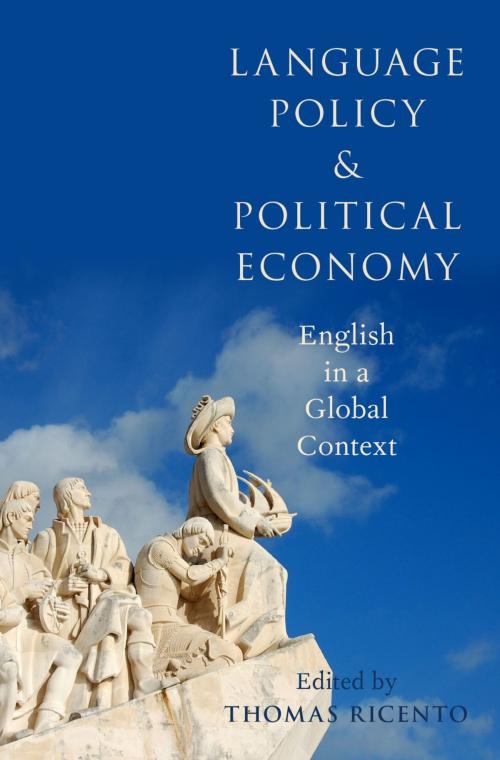Language Policy and Political Economy
English in a Global Context
Nonfiction, Reference & Language, Language Arts, Linguistics, Social & Cultural Studies, Political Science, Politics, History & Theory, Education & Teaching| Author: | ISBN: | 9780190266592 | |
| Publisher: | Oxford University Press | Publication: | February 2, 2015 |
| Imprint: | Oxford University Press | Language: | English |
| Author: | |
| ISBN: | 9780190266592 |
| Publisher: | Oxford University Press |
| Publication: | February 2, 2015 |
| Imprint: | Oxford University Press |
| Language: | English |
This volume articulates a new framework for language policy research that explores the connections between language policy and political economy. The chapters are united in their focus on English, a language that has enjoyed a reputation as a "global language" over the course of the last century and that is perceived as a tool for socioeconomic mobility. The book argues that adopting a new, political economic approach to language policy research will enhance our ability to provide more consistent explanations about the status, functions, benefits, and limitations of English in its various roles in non-English dominant countries. The book poses the questions: Does English serve as a "lingua franca" and does it advance the interests of sustainable economic and social development in low-income countries? Written by leading experts in language policy research, the chapters reveal the myriad and complex ways in which government leaders, policymakers, and communities make decisions about the languages that will be taught as subjects or used as media of instruction in schools. English is often advertised as a social "good" with unquestioned instrumental value, yet access to quality English-medium education in low-income countries tends to be restricted to those with sufficient economic means to pay for it. As the capitalist world economy continues to change and grow, and assuming that translation technologies continue to improve, it is likely that the roles and relative importance of English as a global language will change significantly. Assessing the costs and benefits of acquiring English therefore takes on increased urgency. The book argues that a political economic approach is particularly appropriate in this endeavor, as it takes into account theories and empirical findings from a range of disciplines in order to assess and explain real-world phenomena that do not fit neatly into boxes labeled "economic," "social," "political" or "cultural." Together, the chapters in this volume argue for a new direction in language policy studies-grounded in political economy -- that will explain why English has been experienced as both a blessing and curse in different parts of the world, why English continues to be useful as a lingua franca for particular sectors of the global economy, and why it is a detriment to economic development in many low-income countries. The book will be invaluable to language policy scholars, policy-makers, and educators, significantly advancing research in this important field.
This volume articulates a new framework for language policy research that explores the connections between language policy and political economy. The chapters are united in their focus on English, a language that has enjoyed a reputation as a "global language" over the course of the last century and that is perceived as a tool for socioeconomic mobility. The book argues that adopting a new, political economic approach to language policy research will enhance our ability to provide more consistent explanations about the status, functions, benefits, and limitations of English in its various roles in non-English dominant countries. The book poses the questions: Does English serve as a "lingua franca" and does it advance the interests of sustainable economic and social development in low-income countries? Written by leading experts in language policy research, the chapters reveal the myriad and complex ways in which government leaders, policymakers, and communities make decisions about the languages that will be taught as subjects or used as media of instruction in schools. English is often advertised as a social "good" with unquestioned instrumental value, yet access to quality English-medium education in low-income countries tends to be restricted to those with sufficient economic means to pay for it. As the capitalist world economy continues to change and grow, and assuming that translation technologies continue to improve, it is likely that the roles and relative importance of English as a global language will change significantly. Assessing the costs and benefits of acquiring English therefore takes on increased urgency. The book argues that a political economic approach is particularly appropriate in this endeavor, as it takes into account theories and empirical findings from a range of disciplines in order to assess and explain real-world phenomena that do not fit neatly into boxes labeled "economic," "social," "political" or "cultural." Together, the chapters in this volume argue for a new direction in language policy studies-grounded in political economy -- that will explain why English has been experienced as both a blessing and curse in different parts of the world, why English continues to be useful as a lingua franca for particular sectors of the global economy, and why it is a detriment to economic development in many low-income countries. The book will be invaluable to language policy scholars, policy-makers, and educators, significantly advancing research in this important field.















